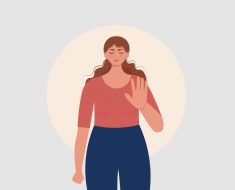Follow these rules to ensure a healthy gut and mental wellbeing for your child and you.
By Payal Kothari
When a recurring feeling of full-blown blah days hits preteens or adults, it could perhaps be a sign of poor gut health.
Check if you are facing any of these symptoms:
The 3 words parents never want to hear “Leave Me Alone.”
Craving sugar all the time.
Always tired, procrastinating saying, “I will do it tomorrow.”
Or worse, your pre-teen is holed up in his/her room more than usual.
This is the time to look for the root cause of these symptoms rather than dismissing them as bad behaviour. They could feel anxiety, be upset or just plain depressed. These mood disorders often begin in the gut. Here’s where the food, gut and mood connection becomes more important than you could ever imagine.
While most doctors would suggest a few mood lifters, antacids or antidepressants, it is actually easy to deal with it on your own with some natural, plant-based, nutrient dense meals and eliminating some intolerant, irritable foods to get that gut in balance.
A diet high in processed foods and refined sugar coupled with stress and an unhealthy lifestyle can create dysbiosis in the gut (the mouth to the colon). These factors can pack a serious whammy to gut health. When the digestive system is out of whack, all you experience is mood swings, unhappiness and imbalances. On the other hand, if you initiated a clean way to eat natural foods and adopt a healthy lifestyle, it could magically turn around in just a couple of days.
Our body has 100 trillion bacteria, out of which 90 per cent are within our gut trying to symbiotically maintain a balance between all functions of the body, including handling our moods. To understand why it all boils down to food and gut, it is important to understand the simple yet sophisticated matrix of the Enteric Nervous System and bacteria. Our gut is compromised due to antibiotics, pill popping, stress and sometimes food intolerances, which leads to a leaky gut that allows small particles of foods, toxins and infectious organisms to enter the bloodstream causing all sorts of diseases and affecting that blood-brain barrier.
To begin with, a few changes that can change the way your pre-teen feels begin with the foods he or she is eating all day long in school or at home. Much intolerance goes undetected, many so called healthy foods are actually doing more damage than good. So to read a food label well is extremely important here.
Gut and brain strategies to feel good and seal a leaky gut:
Let them find their own passion and stop being a helicopter parent.
Begin your child’s day with a fresh glass of coconut water along with some thinly sliced coconut flesh.
Start the day with a teaspoon of homemade ghee to line the digestive tract and seal the leaky gut with good fats.
Avoid gluten rich meals like wheat parathas. Instead, opt for other grains such as jowar, nachni, bajra, quinoa, buckwheat and rice.
Incorporate sports as a non-negotiable activity.
Avoid stressing them out on getting excellent grades.
A reward system works well, so indulge them in sugary desserts on rare occasions.
Ensure they eat a variety of fiber rich fruits and vegetables to multiply the gut bacteria in their intestines.
Add super herbs like curcumin, ginger and garlic in their diet.
Get rid of ordering in APPs, cook with them.
Practice what you preach. Stick to your routines so the pre-teen will too.
Monitor water intake by checking on the colour of their urine.
Their sleeping patterns should be on point.
Limit screen time.
Avoid milk. At times, your preteen could be intolerant to milk. Try an elimination diet for a minimum of two weeks.
Use laughter therapy for stress or take them to a comedy show.
Teach them an attitude of gratitude.
Have a watchful eye on all addictions, like alcohol, smoking or sheesha.
Get them out of the house for some fresh air or a quick run or plan a nature trek.
Spend quality time with them without your phones. Loneliness is a big issue today leading to depression and temper tantrums.
The “happy mood” neurotransmitter, serotonin, is also produced in the gut, way more than in the brain along with 30 other neurotransmitters, so you can now begin to understand why the gut is the centre to feeling happy. Balancing your gut with good probiotic bacteria, you can help your preteen create a happy brain. Disturb the balance and get ready to have a cranky, unwell, unhappy child. Performances at school or outside are dependent on the food, gut and brain. Brain fog is a leading cause of poor gut health. In order to fix the funk, kindly fix the gut. To fix irritability, snappiness and depressive behaviour, start with the gut.
(The writer is an Integrative & Functional Nutritionist.)
Source: Read Full Article





